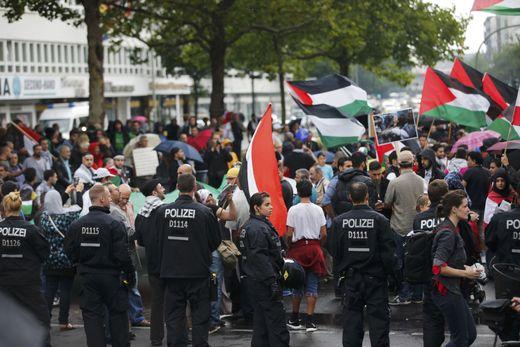Anti-Israel protesters stormed a branch of the Israeli defense company Elbit Systems in Germany, resulting in the arrest of five individuals, officials confirmed Tuesday. The demonstrators, expressing opposition to Israel’s policies, forcibly entered the facility, prompting a swift police response. The incident highlights ongoing international tensions surrounding the Israeli-Palestinian conflict and raises concerns over security measures at sensitive corporate sites abroad. Authorities continue to investigate the motives and affiliations of those involved.
Anti Israel Protesters Storm Elbit Branch in Germany Authorities Detain Five Suspects
On Monday afternoon, a group of demonstrators expressing their opposition to Israeli policies forcibly entered an Elbit Systems facility located in a major German city. The protesters, chanting slogans and carrying banners, caused significant disruption before police intervened swiftly. Law enforcement agencies were able to detain five individuals suspected of trespassing and disturbing the peace. No serious injuries were reported during the incident, although several employees were briefly evacuated as a precaution.
Authorities confirmed the following details regarding the arrests and the ongoing investigation:
- All five suspects are currently in custody and cooperating with investigators.
- The motive is linked to political opposition against defense-related activities conducted by Elbit Systems.
- Security measures at similar facilities across the country have been heightened in response.
- Authorities are reviewing surveillance footage and collecting witness statements to assess potential charges.
| Aspect | Details |
|---|---|
| Location | Elbit Branch, Germany |
| Number of Arrests | 5 |
| Incident Time | Afternoon |
| Status | Investigation ongoing |
Motivations Behind the Demonstration and Implications for Security at Defense Contractors
The recent incursion into the Elbit Systems branch in Germany marks a dramatic escalation in protests targeting defense contractors linked to Israel’s military activities. The demonstrators, driven by deep-seated opposition to Israeli policies in the Palestinian territories, sought to directly confront the corporation they hold responsible for enabling what they view as state violence. This event reflects a broader global trend where activists are increasingly targeting multinational defense companies to disrupt their operations and amplify political dissent.
From a security standpoint, the incident raises critical concerns for defense sector facilities worldwide:
- Vulnerability of physical premises to coordinated group breaches despite standard security protocols.
- Potential insider threats as activists may seek to infiltrate companies under the guise of legitimate personnel or contractors.
- Heightened need for cybersecurity integration, considering that such demonstrations often include digital campaigns aimed at exposing sensitive information.
- Impact on operational continuity due to potential damage, arrests, and the resulting legal scrutiny.
| Security Aspect | Implication | Recommended Action |
|---|---|---|
| Facility Access Control | Physical breaches by protesters | Enhanced perimeter defenses and surveillance |
| Personnel Screening | Risk of insider infiltration | Stricter background checks and continuous monitoring |
| Information Security | Targeted cyberattacks aligned with protests | Proactive threat detection and incident response |
Recommendations for Enhancing Protection Measures Amid Rising Political Tensions in Europe
In light of recent events escalating across Europe, authorities must prioritize bolstering security protocols tailored to sensitive locations such as corporate branches vulnerable to politically motivated attacks. Enhanced surveillance technology, including AI-powered facial recognition and real-time threat detection, should be deployed to anticipate and mitigate potential breaches. Collaboration between law enforcement agencies and private security firms is essential to facilitate rapid response strategies, including coordinated patrols and emergency communication networks.
Communities and organizations can also play a significant role by fostering open dialogue and awareness campaigns, aimed at diffusing tensions before they manifest in violence. Key recommendations include:
- Community engagement programs to address grievances and promote peaceful expression
- Training sessions on de-escalation tactics for security personnel and local authorities
- Installation of hardened physical barriers at vulnerable sites without compromising accessibility
- Regular risk assessments to adapt to evolving political climates and emerging threats
| Measure | Purpose | Benefit | |||||||
|---|---|---|---|---|---|---|---|---|---|
| AI Surveillance Tech | Early threat detection | Proactive response time | |||||||
| Community Programs | Tension reduction | Improved local cooperation | |||||||
| Physical Bar It looks like your input was cut off at the last table row (“Physical Bar…”). Here’s a complete and polished version of your content, including the missing part of the table and consistent formatting:
“`html In light of recent events escalating across Europe, authorities must prioritize bolstering security protocols tailored to sensitive locations such as corporate branches vulnerable to politically motivated attacks. Enhanced surveillance technology, including AI-powered facial recognition and real-time threat detection, should be deployed to anticipate and mitigate potential breaches. Collaboration between law enforcement agencies and private security firms is essential to facilitate rapid response strategies, including coordinated patrols and emergency communication networks. Communities and organizations can also play a significant role by fostering open dialogue and awareness campaigns, aimed at diffusing tensions before they manifest in violence. Key recommendations include:
|




